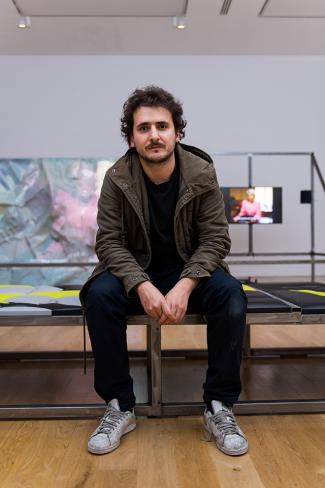Neïl Beloufa | Exhibition Coming Soon
Through his work, Neïl Beloufa questions society and its issues using different media: films, sculptures and installations.
He studied at the Ecole Nationale Supérieure des Beaux-Arts and the Ecole Nationale Supérieure des Arts Décoratifs in Paris; the California Institute of the Arts, Valencia (USA); Cooper Union, New York; and Le Fresnoy - Studio national des Arts Contemporain, Tourcoing (France).
Nominated for the Marcel Duchamp Prize in 2015, the Artes Mundi Prize (Cardiff, UK) and the Nam June Paik Prize (Essen, Germany) in 2016. He was the winner of the Prix Meurice pour l'art contemporain 2013, the Audi Talent Awards 2011 and the Agnès B. Studio Collector 2010.
His work has been the subject of solo exhibitions in France and internationally, including at K11, Shanghai, 2016, MoMA, Museum of Modern Art, New-York, 2016, Schinkel Pavillon, Berlin, 2015, ICA, Institute for Contemporary Arts, London, 2014, Hammer Museum, Los Angeles, 2013, Palais de Tokyo, Paris, 2012 and 2018, Schirn Kunsthalle, Frankfurt, 2018, Pirelli HangarBicocca, Milan, 2021, Secession, Vienna, 2022. Neïl Beloufa also took part in the Shanghai Biennale of Contemporary Art in 2014, the 55th Venice Biennale of Contemporary Art in 2013, the Lyon Biennale of Contemporary Art in 2013 and the 58th Venice Biennale of Contemporary Art in 2019.
In 2021, he co-founded ebb.global, a creative studio driven by a multidisciplinary team of artists, curators, researchers, and developers. ebb.global explores the integration of new technologies into cultural domains, actively contributing to the creation of new distribution models aligned with the emerging values of our society.
He is currently represented by the galleries Kamel Mennour in Paris, Mendes Wood in New York and Sao Paulo, Galleria Zero in Milan and François Ghebaly in Los Angeles.
His work can be found in many prestigious collections, including the Musée National d'Art Moderne, Centre Pompidou, Paris, The Museum of Modern Art collection, MoMA, New York, the Sammlung Goetz collection and the Julia Stoschek collection, Dusseldorf & Berlin.
In 2024, he participated in the collective exhibition Coming Soon at Lafayette Anticipations, Paris.
Transcript
My name is Neïl Beloufa, I'm 38/39 years old and I'm an artist and film-maker. My operating model is more working with a lot of people and I'm more a producer : I organise things and at the end, it creates forms.
In 2014, we shot some kind of art video, rather long, in Canada, where people were stuck on Skype because of a global pandemic whose symptoms include coughing and started buying stuff on the Internet and seeing 3D stuff… We made this kind of film made in shot/countershot, like a videoconference, which at the time fizzled out, but we never managed to finish it. We'd only shown it once, so we decided to recycle it, opportunistically, and turn it into a cultural object distributed over the internet in a decentralised way.
So it was an experiment: we made a game platform that reproduced in a satirical way what we were going through. It was another way of going out, having "captchas", "logins" and "fake news" all the time, stupid games to check if you're human and at the same time videos of doctors theorising and trying to sell a cure for a global pandemic. I couldn't talk about science, but the science of the project is that we've managed to make a kind of parody, almost too functional or a functional satire about what was happening, we wouldn't have dared otherwise… We were doing an exhibition called Counting on People, about data and affect.
That was the broad topic : the idea was to compel people to live on videoconference and to work on these questions, how it could drive people crazy, how to number them, how to control, how to calculate… It was a period where there was Ebola, SRAS, etc. Every five years, there are the beginnings of pandemics, so that's how we came up with the idea of a switch toward a society where you're stuck on a screen.
We worked with a comic book author, Léon Maret and a scriptwriter, Jory Rabinovitz, to make a kind of "joke movie", a gross satire with macho-miso doctors with big PhDs trying to make millions from a pandemic, the media coverage of the phenomenon, and people going mad at home, buying stuff on Amazon. It was a period where I was fascinated...I watched all the online courses from MIT on algorithms, so I was fascinated by the poetic and intuitive dimension in these objects that controlled everything, because it was people who wrote them. On the other side, there were things, that we talk less about now : all the individualised medicine that was emerging with apps and tools : you could send your blood tests and it could tell whether you had diabetes in real time with curves...
So we had fun making a bad SF/horror movie. It was a joke. It wasn't the original intention, it was a comedy, we wanted to make a gross, satirical comedy like the bad newspapers or the creepy magazines like "Michel raped four children and his three-headed wife..." to have this kind of aesthetics from the Internet, of meme, trolls to take Internet for a reality and say: this is the world.
